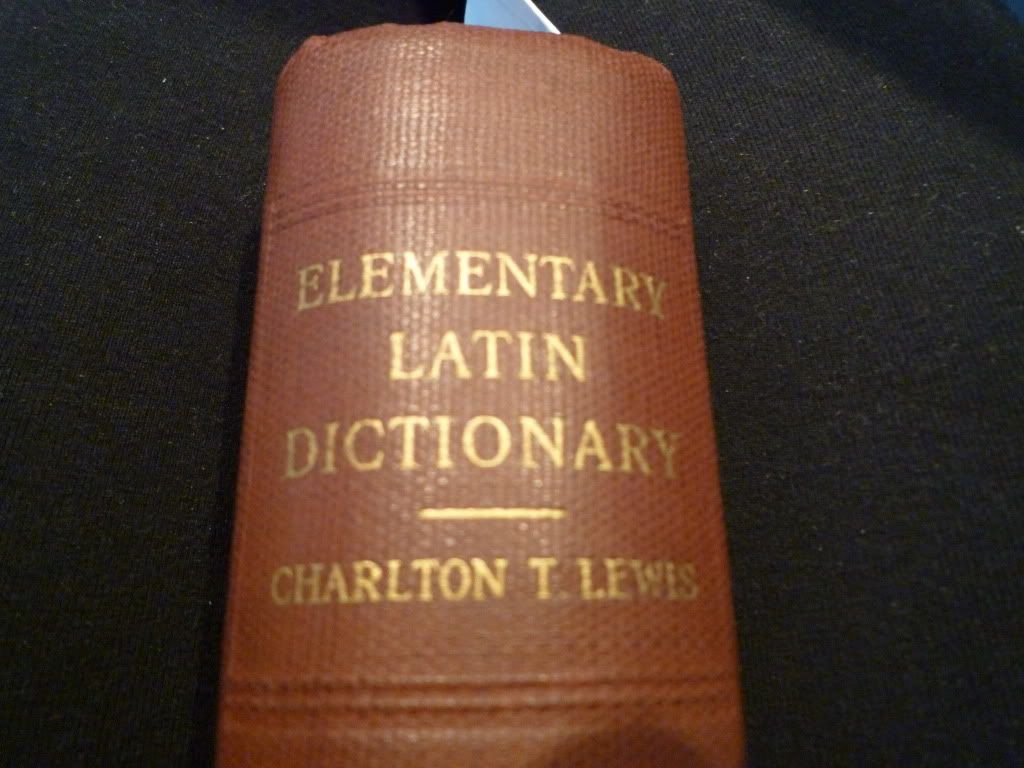Thursday, September 29, 2011
Reasoning: Latin Review
My Latin is rusty. Reading Sallust is a more arduous process for this reason, although I am really enjoying it. When I started taking Latin a few years ago, I learned from the helpful but rather pompously written Latin: An Intensive Course by Moreland & Fleischer. I recently have been reviewing with this book and found an online answer key, which has proved useful when I check over my answers.
Friday, September 23, 2011
Reasoning/Spirited: Classical Greek Accentuation
I am embarrassed to say how long I have not understood Classical Greek accentuation. I tried. My most recent attempt with Hansen & Quinn was more successful than the previous ones, but I was still confused. Finally, reading over the chapter for Prose Composition tomorrow from Eleanor Dickey's Greek Prose Composition [1] I understand. Here is what I learned:
Vowel Quantities:
Verbs:
Vowel Quantities:
- ε and ο are always short
- η and ω are always long
- α, ι, υ can be long or short
- ει, υι, αυ, ευ, ου, ᾳ, ῃ, ῳ are always long.
- αι and οι are long when:
- They are not at the end of a word
- When they end a verb in the optative
- When they end locative adverbs (e.g. οἴκοι)
- In some interjections (e.g. αἰαῖ)
- There are three types of accents: acute (´), grave (`), and circumflex (^/~)
- The acute accent (´) can appear over any of the last three syllables (antepenult, penult, and ultima).
- If the last syllable is short, the acute vowel may stand on the antipenult, irrespective of the vowel quantity of the penult (the sort of exception to this rule is contract verbs. See verbs).
- If the last vowel is long, the acute accent must sit on the penult or the ultima.
- The grave (`) accent may only appear on the ultima
- It may appear over long or short vowels
- It may only appear when it replaces an acute accent when another word follows without pause unless the following words is an enclitic.
- The circumflex accent (^) may only appear over the penult and the ultima
- It can only stand over a long vowel
- It must appear over a long penult when the ultima is short
- It may not appear over over a long penult when the ultima is long
Verbs:
- Most verbs have recessive accents (they go as close to the beginning of the word as possible), except infinitives and participles (which have persistent accents).
- Recessive accents always appear over the antepenult or penult.
- In the optative, αι and οι are long at the end of a word
- Contract Verbs (and other contract words) have accents that reflect the uncontracted form of the words
- If the accented syllable is not the one that contracts, there is no effect on the accent.
- If the accented vowel is the first of the two vowels that contract, the resulting vowel will have a circumflex
- If the accented vowel is the second vowel in the contracted pair, it will have an acute accent.
- The example of παιδευσαι: παίδευσαι 2nd person singular aorist middle imperative, (αι is short) παιδεύσαι 2nd person singular aorist active optative (αι is long), παιδεῦσαι aorist active infinitive (accent is persistent).
- Except where noted, nouns and adjectives have persistent accent
- If the final syllable is accented, circumflexes tend to appear in the oblique cases (genitive and dative) while acute accents tend to appear in nominative, vocative, and accusative. e.g. ἀγοράς is accusative while αγορᾶς is genitive.
- First Declension Nouns
- Feminine first declension nouns ending in α have a short α except when the α is preceded by ε, ι, or ρ, in which case the ᾱ is long (with a few exceptions)
- NOTE: feminine first declension nouns with a short α ending have recessive accents except on the genitive plural ῶν which is always accented with a circumflex.
- Genitive and accusative plural ᾱς (α is long)
- For masculine first declension nouns ending in ᾱς, the α is long.
- All nouns of the first declension have the genitive plural ῶν which is always accented with a circumflex, irrespective of accentuation rules. This is not true of first declension adjectives
- First and Second Declension Nouns and Adjectives
- If the basic accent is on the ultima, it is an acute in the nominative, vocative, and accusative, but a circumflex in the genitive and dative of both singular and plural in all genders
- Third Declension
- Third declension nouns ending in α, the α is alwazs short
- Third-declension neuter nouns ending in -ς (e.g. γένος) have recessive accents .
- Monosyllabic nouns of the third declension accent the stem of the nominative, vocative, and accusative and the ending of genitive and dative.
- Words of the πόλις-type have accent that stays on the same syllables throughout the paradigm, irrespective of the rules of accent.
- βασιλεύς-type and some other words have paradigm-specific rules.
- enclitics have no accent of their own and follow accented words, whose accents they affect
- If the accent is on the ultima and it is acute and the word is followed by an enclitic, it does not change to grave.
- If the main word has an accent on the penult:
- If the accent is acute
- If the enclitic is a single syllable, it takes no accent.
- If the enclitic is more than on syllable, it takes an accent on its ultima (either acute or circumflex)
- If the accent is a circumflex
- There is no change irrespective of the number of syllables of the enclitic
- If the main word has an accent on the antepenult, it adds a second accent on its own ultima.
- If several enclitics appear in succession, each one takes an accent on its penult, except for the last in the series.
- Proclitics have no accents of their own and are accentual joined to the following word.
- If followed by an accented word, they cause no change
- If followed by an enclitic, they take an acute accent (from the enclitic)
- Greek words for the positions of acute accents: ὀξύς (sharp, pointed, quick, swift) τόνος (musical note) the idea being that the accent gives a rise in pitch (musical tone) to the vowel.
- ὀξύτονον-- acute accent on the ultima
- παροξύτονον-- acute accent on the penult
- προπαροξύτονον-- acute accent on the antepenult
- Greek words for the positions of circumflex accents: περι (around) σπώμενον (from "I drag") the idea being that the musical pitch is dragged back to its origin by the accent
- περισπώμενον-- circumflex on the ultima
- παραπερισπώμενον-- circumflex on the penult
Endnotes
- This is not a published book. It is a manuscript Dickey put out in 2003. I am here reorganizing and summarizing what she says, re-explaining some of the concepts myself, and adding a couple of pieces from Hansen & Quinn and from my class today. If I make any mistakes (which I very well might) comment with corrections.
Monday, September 19, 2011
Appetitive: Final Marathon 2500 Lecture
The final lecture of the Marathon 2500 Series is coming up on Wednesday. It's a free online lecture by the wonderful Paul Cartledge. The whole series is great and it is up online if you want to listen to the previous lectures.
Monday, September 12, 2011
Appetitive: Latin Dictionary
As I mentioned before, I love buying school supplies. One of the things I thought that I should get was a Latin dictionary. I have Cassell's , which is quite full and fantastic for prose composition, but I wanted a fuller dictionary. So I bought an Elementary Lewis
, which is quite full and fantastic for prose composition, but I wanted a fuller dictionary. So I bought an Elementary Lewis . It's a beautiful copy from 1915 I got cheaply. It's lovely.
. It's a beautiful copy from 1915 I got cheaply. It's lovely.
Some posts with some actual content soon, I'm busy studying for my exams.
Some posts with some actual content soon, I'm busy studying for my exams.
Saturday, September 3, 2011
Spirited: My Paper
I am still writing my paper on the Parthenon frieze and then my art history final. More soon...
Friday, September 2, 2011
Reasoning: Ancient Greek Paradigms, Part 2
| Actual Size |
So far, I think it's fabulous. It does not have every single thing in it--e.g. it does not have have third person pronouns-- but overall it encompasses most of the paradigms I will need and it's a neat little book that is small, light, and can be carried easily.
As a point of interest, it was created by three St. John's alumni, and it's pretty cool that they put it together.
Thursday, September 1, 2011
Appetitive: A Plato Scholar on Beauty
This is not a particularly classics related post, but it is a great video anyway. Alexander Nehamas, a philosophy professor at Princeton who writes about Plato, gave a lecture a few days ago for Big Ideas on "Individual Character and Ideas of Beauty," which I found very enjoyable. About a third of the lecture argues against Kant's theory of aesthetics (which I am ashamed to say I have not read), about a third is about Manet's Olympia, and another third talks about Plato. Enjoy!

Subscribe to:
Posts (Atom)


